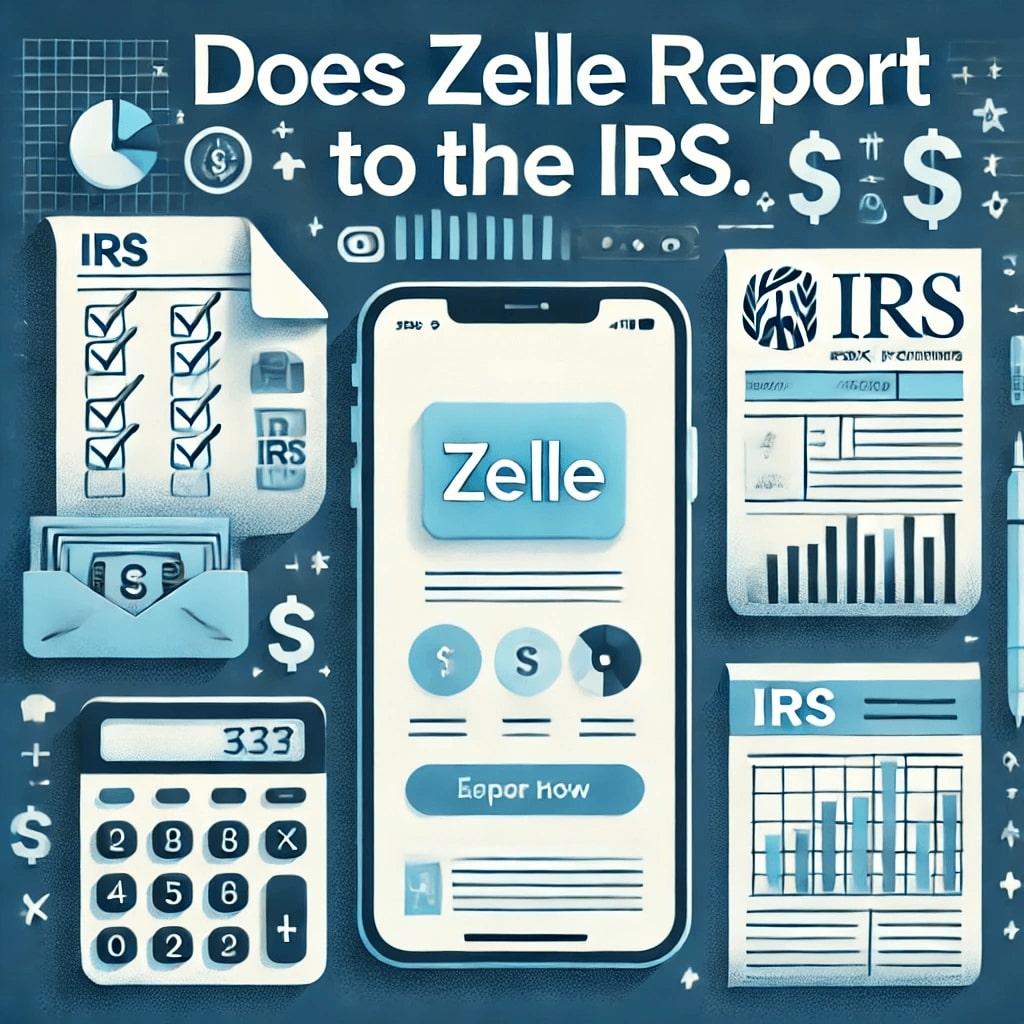
By dev October 4, 2024
In today’s digital age, financial transactions have become increasingly convenient and efficient. One such platform that has gained popularity is Zelle, a peer-to-peer payment service that allows users to send and receive money directly from their bank accounts. With its ease of use and widespread adoption, many individuals wonder about the reporting requirements of Zelle transactions to the Internal Revenue Service (IRS).
In this article, we will delve into the intricacies of Zelle’s reporting obligations and shed light on the role of financial institutions in facilitating these transactions.
Understanding the Reporting Requirements of Financial Institutions

Financial institutions play a crucial role in the functioning of Zelle transactions. As intermediaries between users, they are responsible for ensuring compliance with various reporting requirements. These requirements are primarily governed by the Bank Secrecy Act (BSA) and the USA PATRIOT Act, which aim to prevent money laundering, terrorist financing, and other illicit activities.
Under these regulations, financial institutions are obligated to report certain transactions to the IRS. These reports help the IRS monitor and track financial activities, ensuring tax compliance and detecting any potential fraudulent or illegal activities. However, the specific reporting requirements for Zelle transactions may vary depending on the nature and amount of the transaction.
Does Zelle Report Transactions to the IRS?
Zelle, as a payment platform, is not directly responsible for reporting transactions to the IRS. Instead, it is the financial institution that holds the user’s Zelle account that is responsible for reporting the transactions. Zelle acts as a facilitator for the transfer of funds between users, but it does not have access to the specific details of each transaction.
When a user sends or receives money through Zelle, the transaction is processed by the user’s bank or credit union. It is the responsibility of the financial institution to report any applicable transactions to the IRS. Therefore, if you use Zelle to send or receive money, it is your financial institution that will report the transaction to the IRS, not Zelle itself.
The Role of Zelle in Tax Reporting
Zelle acts as a facilitator for financial transactions, providing a platform for users to transfer funds. As such, it does not have access to the specific details of these transactions, such as the purpose or nature of the payment. Therefore, it is not in a position to report this information to the IRS. Instead, it is the responsibility of the financial institution to gather and report the necessary information to the IRS.
Zelle and the 1099-K Form: Explained

One of the key forms used for tax reporting is the 1099-K form. This form is used to report payment card and third-party network transactions to the IRS. Zelle transactions fall under the category of third-party network transactions, which means that they may be subject to reporting on the 1099-K form. However, it is important to note that not all Zelle transactions will trigger the reporting threshold for the 1099-K form.
Thresholds for Reporting Zelle Transactions
Financial institutions are required to report Zelle transactions on the 1099-K form if the following thresholds are met:
- Gross payments exceed $20,000: If the total gross payments received through Zelle in a calendar year exceed $20,000, the financial institution is required to report these transactions to the IRS.
- More than 200 transactions: If the total number of transactions received through Zelle in a calendar year exceeds 200, the financial institution must report these transactions to the IRS.
It is important to note that these thresholds apply to the recipient of the funds, not the sender. Therefore, if you are the one sending money through Zelle, you do not have to worry about meeting these reporting thresholds.
Tax Implications of Zelle Transactions: Individual Taxpayers
For individual taxpayers, Zelle transactions can have various tax implications. Here are some common scenarios and their tax implications:
- Receiving money as a gift: If you receive money through Zelle as a gift, it is generally not taxable income. The IRS allows individuals to receive gifts up to a certain amount without incurring any tax liability. As of 2021, the annual gift tax exclusion is $15,000 per person. If the gift exceeds this amount, the giver may be required to file a gift tax return, but the recipient does not owe any taxes.
- Receiving money for services rendered: If you receive money through Zelle for services you provided, such as freelance work or consulting, that income is generally taxable. You should report this income on your tax return and pay any applicable taxes.
- Receiving money as rental income: If you receive rental income through Zelle, it is considered taxable income. You should report this income on your tax return and may be eligible to deduct certain expenses related to the rental property.
- Receiving money as a loan repayment: If you receive money through Zelle as a loan repayment, it is generally not taxable income. Loan repayments are not considered income because you are simply receiving back the money you lent.
- Receiving money as a reimbursement: If you receive money through Zelle as a reimbursement for expenses you incurred, it is generally not taxable income. Reimbursements are not considered income because you are being repaid for money you already spent.
Tax Implications of Zelle Transactions: Small Business Owners

For small business owners, Zelle transactions can have specific tax implications. Here are some common scenarios and their tax implications:
- Receiving payments for goods or services: If you receive payments for goods or services through Zelle, those payments are considered income for your business. You should report this income on your business tax return and pay any applicable taxes.
- Making payments for business expenses: If you make payments for business expenses through Zelle, those payments may be tax-deductible. You should keep records of the transactions and consult with a tax professional to determine the eligibility of the expenses for deductions.
- Receiving payments as a loan repayment: If you receive payments through Zelle as a loan repayment from your business, it is generally not taxable income. Loan repayments are not considered income because you are simply receiving back the money your business lent.
- Receiving payments as a reimbursement: If you receive payments through Zelle as a reimbursement for business expenses, it is generally not taxable income. Reimbursements are not considered income because you are being repaid for money your business already spent.
Reporting Zelle Transactions as Income or Expenses
When it comes to reporting Zelle transactions as income or expenses, it is important to keep accurate records. If you receive funds through Zelle for goods or services provided, you should report these payments as income on your tax return. This income should be reported on the appropriate form, such as Schedule C for self-employed individuals or Form 1099-MISC for freelancers.
On the other hand, if you use Zelle to pay for business expenses, such as office supplies or professional services, these payments can be deducted as business expenses on your tax return. It is important to keep detailed records of these transactions, including receipts and invoices, to support your deductions in case of an audit.
Tax Reporting for Businesses and Self-Employed Individuals
For businesses and self-employed individuals, accurate tax reporting is crucial. When it comes to Zelle transactions, it is important to keep track of all incoming and outgoing payments. This includes not only payments received for goods or services but also payments made for business expenses.
To ensure accurate tax reporting, consider implementing the following practices:
- Keep detailed records: Maintain a record of all Zelle transactions, including the purpose of the payment, the amount, and the date. This will help you accurately report your income and expenses.
- Separate personal and business transactions: If you use Zelle for both personal and business transactions, it is important to keep them separate. Maintain separate accounts or use separate tags or labels to easily distinguish between personal and business transactions.
- Consult a tax professional: If you are unsure about the tax implications of your Zelle transactions or need assistance with tax reporting, it is always a good idea to consult a tax professional. They can provide guidance tailored to your specific situation and help you navigate the complexities of tax reporting.
Tips for Accurate Tax Reporting with Zelle Transactions
To ensure accurate tax reporting with Zelle transactions, consider the following tips:
- Keep track of all Zelle transactions: Maintain a record of all incoming and outgoing payments made through Zelle. This includes both personal and business transactions.
- Categorize transactions: Categorize your Zelle transactions based on their purpose, such as income or business expenses. This will help you accurately report them on your tax return.
- Use accounting software: Consider using accounting software or apps that integrate with Zelle to streamline your record-keeping and tax reporting processes. These tools can help automate the categorization and tracking of your transactions.
- Review your records regularly: Regularly review your Zelle transaction records to ensure accuracy and identify any discrepancies. This will help you catch any errors or omissions before tax time.
Tips for Ensuring Compliance with IRS Reporting Guidelines
To ensure compliance with IRS reporting guidelines when using Zelle, consider the following tips:
- Keep accurate records: Maintain detailed records of all your Zelle transactions, including transaction dates, amounts, and descriptions. This will help you accurately report the transactions on your tax return and provide evidence in case of an IRS audit.
- Consult with a tax professional: If you have any questions or concerns about the tax implications of your Zelle transactions, seek guidance from a qualified tax professional. They can provide personalized advice based on your specific situation and help you navigate the complexities of tax reporting.
- Stay informed about IRS guidelines: The IRS regularly updates its guidelines and reporting requirements. Stay informed about any changes that may affect your Zelle transactions and ensure compliance with the latest regulations.
- Use accounting software: Consider using accounting software or apps that integrate with Zelle to streamline your record-keeping and tax reporting processes. These tools can help you track and categorize your transactions, making it easier to report them accurately on your tax return.
FAQs
Q.1: Do I need to report Zelle transactions on my tax return?
If you receive funds through Zelle for goods or services provided, you should report these payments as income on your tax return. Personal payments made through Zelle do not need to be reported.
Q.2: Will I receive a 1099-K form for my Zelle transactions?
You will only receive a 1099-K form if you meet the reporting thresholds set by your financial institution. If your Zelle transactions exceed $20,000 in gross payments or 200 transactions in a calendar year, you may receive a 1099-K form.
Q.3: Can I deduct Zelle payments as business expenses?
Yes, if you use Zelle to pay for business expenses, such as office supplies or professional services, these payments can be deducted as business expenses on your tax return.
Q.4: Will the IRS know if I use Zelle?
The IRS does not have direct access to your Zelle transactions. However, your financial institution may report certain transactions to the IRS, depending on the reporting thresholds.
Q.5: What happens if I don’t report my Zelle transactions?
Failing to report taxable income or tax-deductible expenses from Zelle transactions can result in penalties and interest if the IRS discovers the omission. It is important to accurately report all income and expenses on your tax return to avoid any potential issues.
Q.6: Can I deduct Zelle transaction fees?
If you incur transaction fees when using Zelle for business purposes, those fees may be tax-deductible as a business expense. Keep records of the fees and consult with a tax professional to determine their deductibility.
Conclusion
In conclusion, while Zelle itself does not directly report transactions to the IRS, financial institutions that offer Zelle as a service are required to comply with IRS reporting requirements. Zelle transactions may be subject to reporting on the 1099-K form if they meet certain thresholds. It is important for individuals and businesses to understand the tax implications of their Zelle transactions and accurately report them on their tax returns.
By keeping detailed records, categorizing transactions, and consulting a tax professional if needed, individuals and businesses can ensure accurate tax reporting with Zelle transactions.